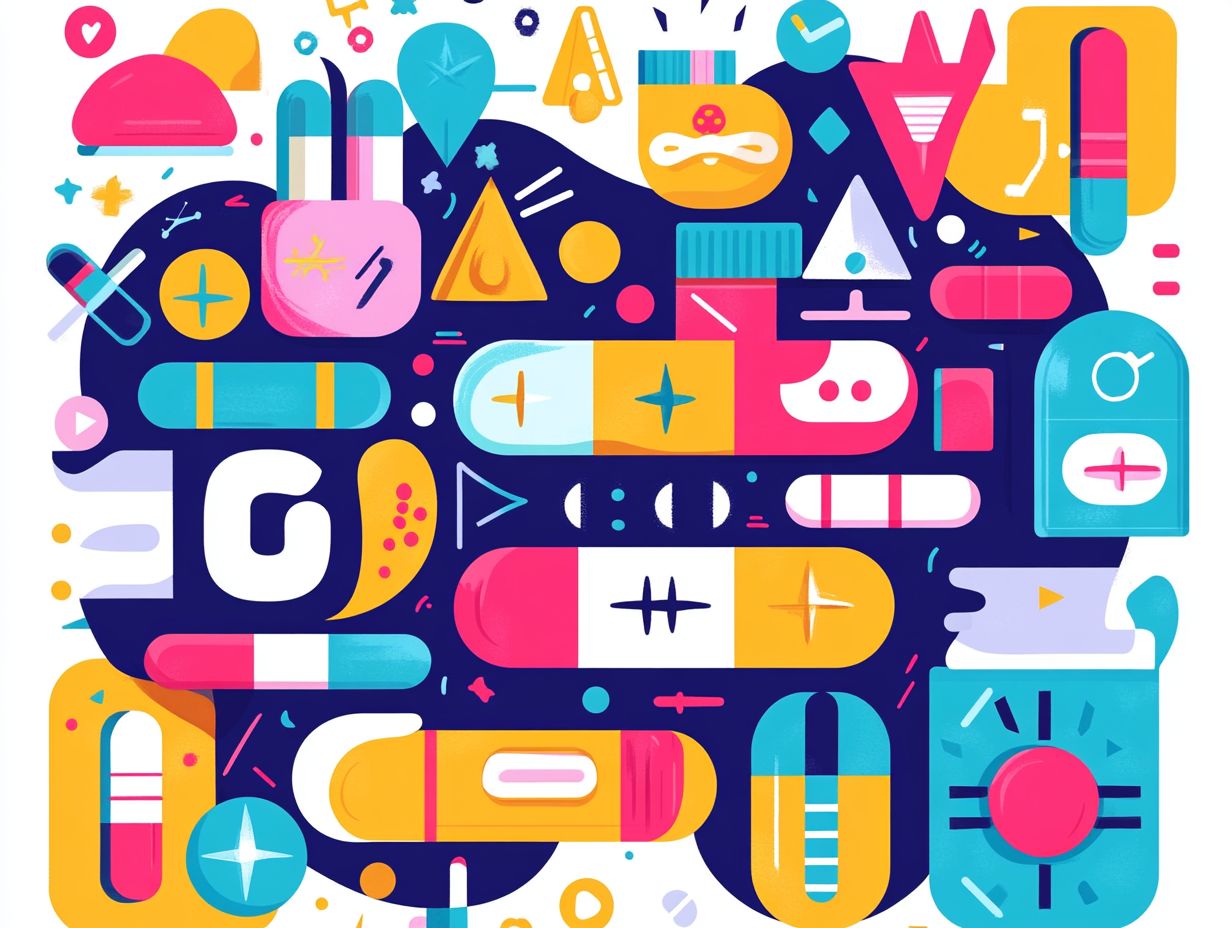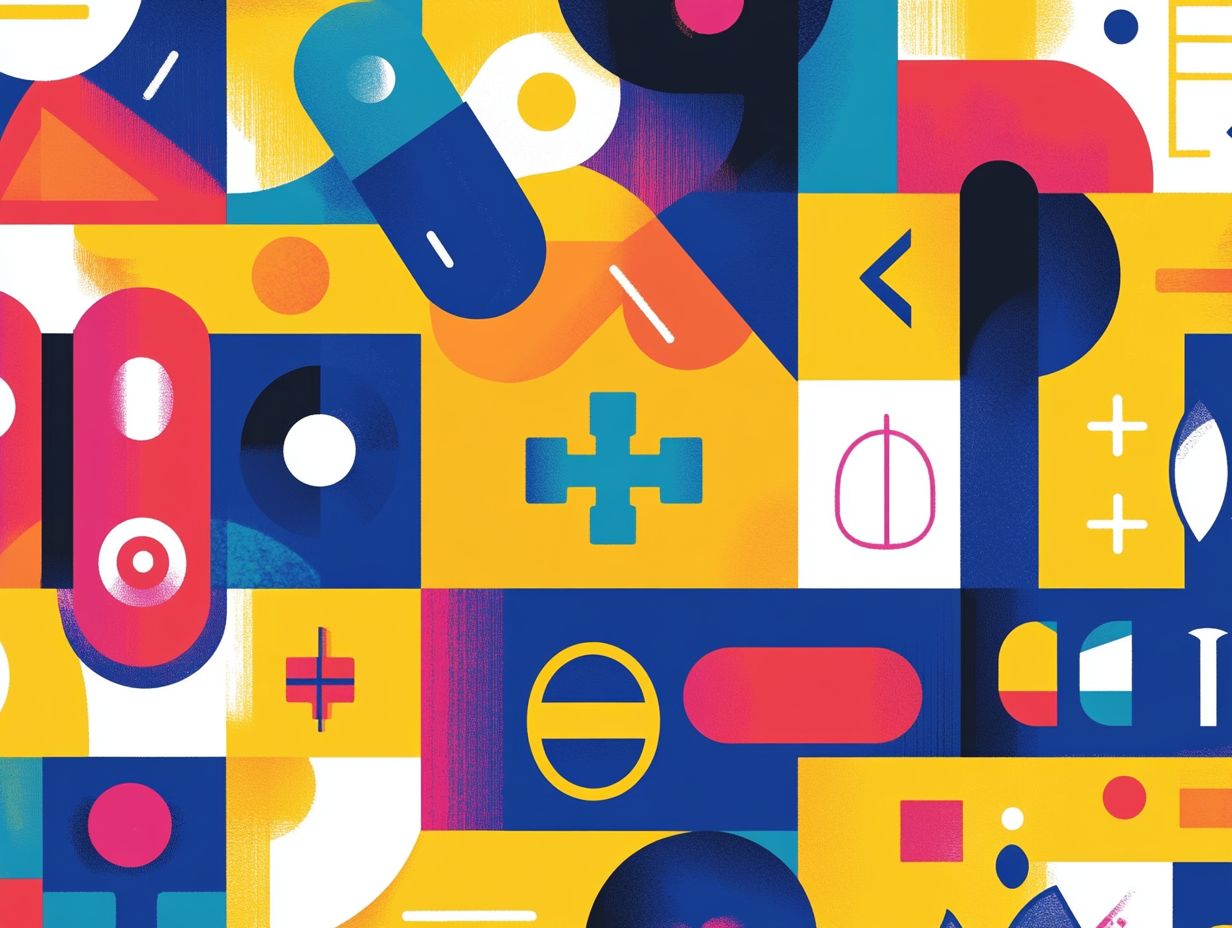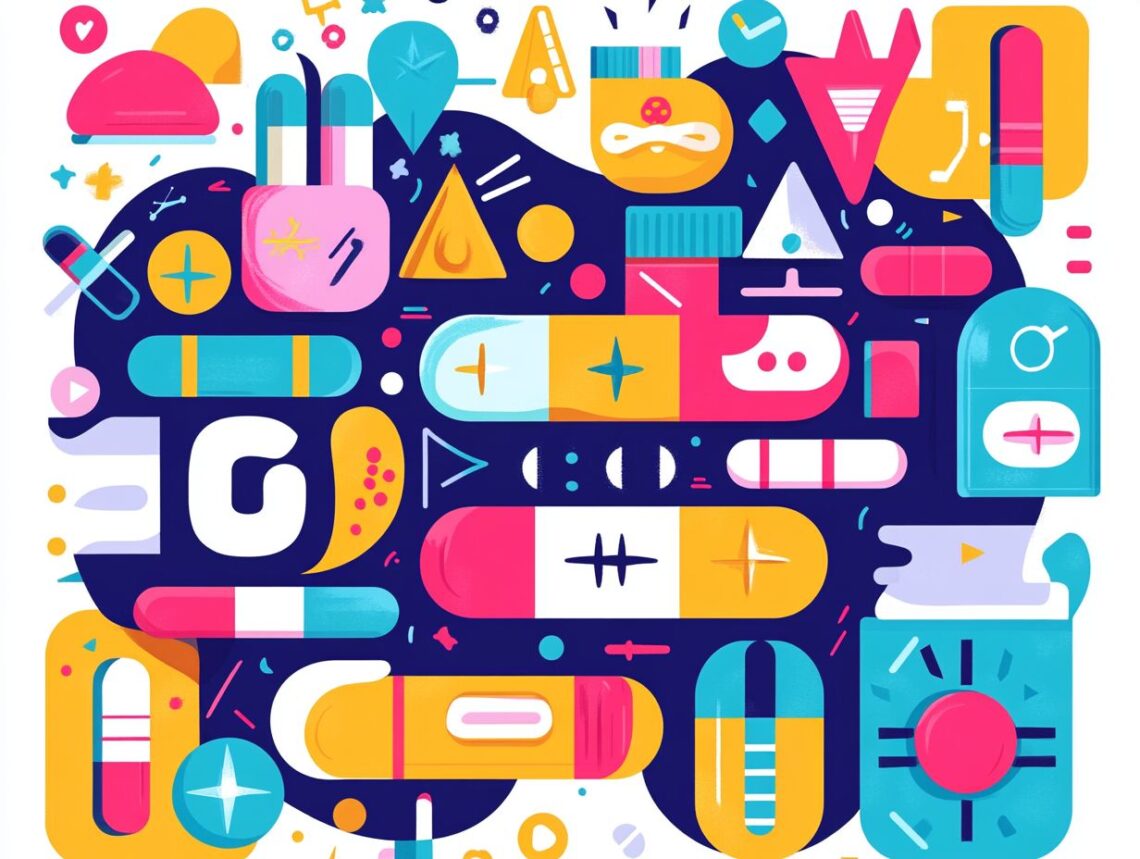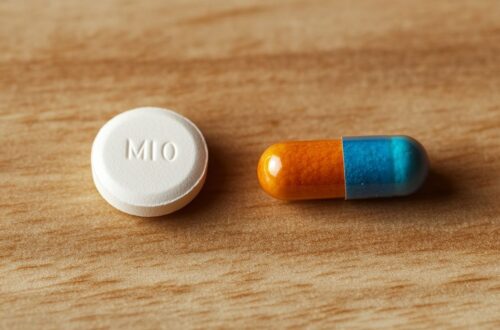Adderall has gained significant recognition, particularly among individuals seeking assistance for attention deficit hyperactivity disorder (ADHD) or those in need of an enhancement in productivity.
This article aims to provide a comprehensive overview of Adderall, detailing its effects and exploring potential alternatives, including both natural supplements and other prescription medications. It also addresses the side effects associated with Adderall and offers practical guidance on managing dependency. Furthermore, readers will find information regarding the various street names for this drug. This exploration provides an opportunity to gain a deeper understanding of Adderall and its implications.
Key Takeaways:
Understanding Adderall

A comprehensive understanding of Adderall is crucial for patients, caregivers, and healthcare professionals, given its significant role in the management of conditions such as ADHD (Attention Deficit Hyperactivity Disorder) and narcolepsy.
This prescription medication primarily comprises dextroamphetamine and amphetamine, functioning by modifying brain chemistry to enhance focus and mitigate hyperactive behaviors.
By being well-informed about its indications, dosage guidelines, and potential side effects, individuals can effectively navigate the complexities associated with ADHD and related disorders while recognizing the importance of safe and responsible medication use. Regular consultation with a doctor ensures that the treatment plan is tailored to the patient’s medical history and health needs.
What is Adderall?
Adderall is a prescription medication that consists of a combination of amphetamine and dextroamphetamine, primarily indicated for the treatment of Attention Deficit Hyperactivity Disorder (ADHD) and narcolepsy.
This potent formulation enhances the levels of certain neurotransmitters in the brain, specifically dopamine and norepinephrine, which are critical for the regulation of attention and behavior. Adderall is administered orally, generally available in both immediate-release and extended-release tablet forms, allowing for flexible dosing that can be customized to meet individual patient needs.
The therapeutic effects of Adderall often include increased concentration, reduced impulsivity, and enhanced cognitive function, making it particularly beneficial for both children and adults diagnosed with ADHD. Furthermore, individuals suffering from narcolepsy, a sleep disorder characterized by excessive daytime sleepiness, may also experience relief through the use of this medication, establishing it as an essential component of treatment for diverse populations. Monitoring by healthcare professionals is crucial to prevent potential misuse and ensure safety.
Alternatives to Adderall
Individuals seeking alternatives to Adderall have access to a variety of options, including both natural supplements and other prescription medications designed to manage ADHD symptoms effectively and safely.
While stimulant medications such as Ritalin may be considered, many individuals opt for natural alternatives to enhance focus and energy while minimizing the potential side effects associated with stimulant use. Consulting with a healthcare provider ensures that the chosen treatment aligns with the patient’s mental health and medical history.
It is essential to consult with a healthcare provider to determine the most appropriate alternatives tailored to individual health needs and treatment objectives.
Natural Supplements for Focus and Energy
Natural supplements aimed at enhancing focus and energy are increasingly sought after by individuals seeking to manage ADHD symptoms without the side effects typically associated with prescription medications such as Adderall.
Among the numerous options available, supplements like omega-3 fatty acids, commonly found in fish oil, have garnered attention for their potential to support cognitive function and improve attention span. Additionally, herbal remedies such as ginkgo biloba and ginseng are believed to enhance mental clarity and elevate energy levels, although research regarding their efficacy remains inconclusive.
Another significant option is Rhodiola rosea, which is esteemed for its adaptogenic properties and may assist in reducing fatigue and improving endurance during mentally demanding tasks.
These natural alternatives are particularly appealing to those who wish to prioritize their mental health while managing the challenges associated with ADHD, offering a more holistic approach to enhancing focus and energy.
Prescription Alternatives

Prescription alternatives to Adderall include other stimulant medications, such as Ritalin, as well as non-stimulant options that can effectively manage symptoms of Attention Deficit Hyperactivity Disorder (ADHD).
These alternatives function through various mechanisms within the brain to enhance focus and mitigate impulsivity. For example, Ritalin increases the levels of dopamine and norepinephrine in the brain, akin to Adderall, but may exhibit a more rapid onset of action. Non-stimulant options like Strattera provide a different therapeutic approach by selectively inhibiting the reuptake of norepinephrine, which may be advantageous for individuals who experience anxiety or have a history of substance use disorders.
When considering these medications, patients should carefully evaluate the potential benefits in relation to possible side effects, such as alterations in appetite or sleep patterns. Coordination difficulties and mood swings may also arise, necessitating a balanced approach in treatment planning.
Therefore, it is imperative for any individual contemplating these alternatives to engage in a comprehensive discussion with their healthcare provider to formulate a treatment plan that is tailored to their specific health requirements.
Side Effects of Adderall
When considering Adderall as a treatment option, it is essential to recognize the potential side effects that may occur. These side effects can vary from common issues, such as nervousness and appetite suppression, to more severe risks, including cardiovascular complications and the potential for addiction.
A comprehensive understanding of both the typical and serious side effects is vital for patients and caregivers in making informed decisions concerning the management of ADHD and narcolepsy. This knowledge ensures that the benefits of the medication are weighed against any potential health risks.
Common and Severe Side Effects
Common side effects of Adderall include nervousness, dry mouth, and appetite suppression, while severe side effects may encompass increased heart rate, elevated blood pressure, and a risk of sudden death.
These side effects can significantly affect daily life and may hinder adherence to treatment. A study published in the Journal of Attention Disorders indicates that up to 20% of patients report experiencing anxiety or restlessness as a direct result of Adderall use.
Approximately 5% of patients may experience serious cardiovascular events, underscoring the importance of regular monitoring for these symptoms. Behavioral changes, such as agitation or aggressive behavior, are also common and require careful attention.
It is essential for healthcare providers to remain vigilant and implement strategies to effectively identify and manage side effects, ensuring that patients receive a balanced approach to their treatment plan.
Managing Adderall Dependency
Managing Adderall dependency necessitates careful planning and professional guidance, especially when tapering off the medication to mitigate withdrawal symptoms and facilitate a successful recovery from addiction.
It is essential for individuals to recognize the potential for misuse and the significance of adhering to prescribed dosages to avoid developing a dependency on this stimulant medication.
By employing a combination of therapy, support systems, and medical oversight, patients can effectively navigate the challenges associated with discontinuing Adderall and work towards achieving a healthier lifestyle.
Tips for Tapering Off and Coping with Withdrawal

Tapering off Adderall should be conducted with caution and under the supervision of a healthcare professional to minimize withdrawal symptoms and facilitate a smoother recovery process. Therapy and counseling may be recommended to address any underlying mental health issues, such as depression or bipolar disorder, that could complicate recovery.
It is essential to gradually decrease the dosage to allow the body to adjust to lower levels of the medication, which can help prevent potential adverse reactions. Individuals should closely monitor any withdrawal symptoms, such as fatigue, mood swings, or changes in appetite, as these indicators can offer valuable insights into how the body is coping with the transition.
Establishing a support network that includes friends, family, or support groups can also be highly beneficial, providing encouragement and understanding during this challenging period. Furthermore, maintaining engagement with a healthcare provider throughout the tapering process ensures that individuals receive the necessary guidance and monitoring to effectively navigate any challenges that may arise.
Other Names for Adderall
Adderall is recognized by multiple names, both in its official prescription form and its commonly misused street names, underscoring the importance of awareness in preventing substance abuse and misuse among adolescents and adults.
Familiarity with these names enables patients, parents, and healthcare providers to identify potential misuse and intervene proactively, thereby safeguarding mental health and well-being, particularly among vulnerable populations affected by Attention Deficit Hyperactivity Disorder (ADHD) or narcolepsy.
Common Street Names
Common colloquial names for Adderall include “Addys,” “Pep Pills,” and “Dexies,” which are frequently referenced in discussions among individuals misusing the medication.
These informal terms not only indicate a casual attitude toward the drug but also underscore a concerning trend of recreational use, particularly among students and professionals seeking to enhance focus and productivity often associated with ADHD and narcolepsy treatment.
The implications of such misuse are significant, often resulting in dependency, heightened anxiety, heart problems, and a range of adverse health effects.
Understanding these slang terms emphasizes the necessity of raising awareness about the potential risks associated with the use of prescription medications without appropriate medical supervision, which can include side effects such as agitation, nervousness, and even sudden death.
By promoting discussions around these terms, it becomes easier to educate individuals, with the ultimate goal of safeguarding mental health, preventing substance abuse, and encouraging recovery through guidance and proper treatment approaches within communities.
Frequently Asked Questions
What are other words for Adderall?

Other words for Adderall include amphetamine, dextroamphetamine, mixed amphetamine salts, lisdexamfetamine, and Ritalin, commonly used for ADHD treatment.
What is Adderall XR and how is it different from Adderall?
Adderall XR is an extended-release version of Adderall, which means it releases the medication into the body over a longer period of time, reducing the potential for overdose and making it an option for safer coordination with other medications. This allows for once-daily dosing, whereas regular Adderall usually requires multiple doses throughout the day.
Are there any generic alternatives to Adderall?
Yes, there are generic versions of Adderall available, such as amphetamine-dextroamphetamine and lisdexamfetamine. These are typically more affordable options for those who cannot or do not want to pay for the brand name version, and can be used in the treatment of ADHD and narcolepsy.
What are some street names for Adderall?
Some street names for Adderall include “speed,” “uppers,” and “study buddies.” These terms are often used to refer to the stimulant effects of the medication, which can lead to aggressive behavior and mood swings.
Why is Adderall a controlled substance?
Adderall is classified as a controlled substance because it has a high potential for abuse and dependence. It is a stimulant medication that can be habit-forming, and misuse or overuse can lead to serious health consequences such as addiction and mental health issues.
Can Adderall interact with other medications?
Yes, Adderall can interact with other medications, including antidepressants, blood pressure medications, and certain antibiotics. It is important to inform your doctor of all medications you are taking before starting Adderall to avoid potential interactions and ensure safety in your treatment plan.





